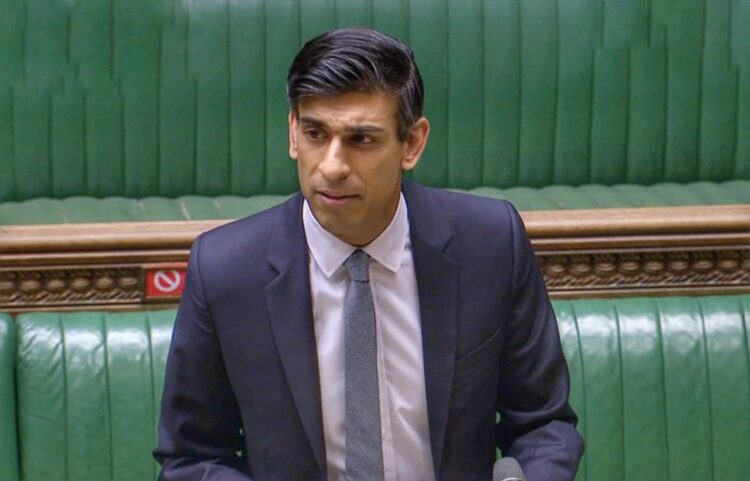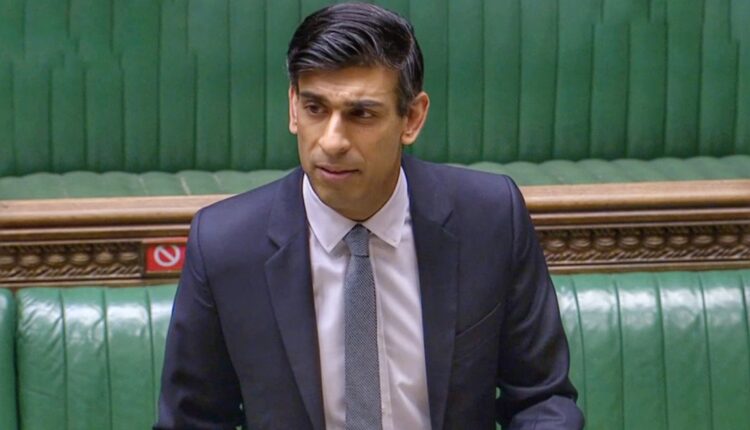Business and political leaders and entrepreneurs have welcomed many of the measures in Rishi Sunak’s Budget but say he has fallen short in some areas. Tony McDonough reports

Business leaders and entrepreneurs from across the Liverpool city region have offered their reaction to Chancellor Rishi Sunak’s spring Budget.
In his statement to the House of Commons, Mr Sunak unveiled a number of measures designed to continue supporting businesses through the COVID-19 crisis as as well measures to boost the recovery.
Mr Sunak said the furlough scheme would be extended until the end of September ands employee’s will continue to receive 80% of their salaries for hours not worked. As business reopens from July there will be a small contribution from employers of 10% and 20% in August and September.
He also extended the self-employment support grant to the end of September. There will be a fourth grant covering February to April, worth 80% of trading profits, and a fifth grant from May which will offer 80% to those who have seen their turnover fall by 30% or more. Those whose turnover has fallen by less than 30% will only be able to claim a 30% grant.
READ MORE: Liverpool city region Freeport cold create 14,000 jobs
Other measures included a rise in incentive grants for apprenticeships to £3,000, tax breaks to unlock £20bn worth of investment, VAT rate for hospitality firms to be maintained at reduced 5% rate until September, a business rates holiday for firms in England to continue until June with 75% discount after that.
There was also £6,000 per premises for non-essential outlets due to re-open in April and £18,000 for gyms, personal care providers and other hospitality and leisure businesses. A new visa scheme is being established to help start-ups and rapidly growing tech firms source talent from overseas.
READ MORE: At-a-glance guide to the spring Budget
Support for the wider economy included a new £12bn UK Infrastructure Bank, £1bn in green bonds to help finance the transition to net zero by 2050, a £1bn Towns Fund fund to promote regeneration in 45 English towns, £150m for community groups to take over pubs at risk of closure, and the first eight sites for freeports in England.
There is concern among business people about the decision to raise corporation tax, a tax paid on profits, from 19% to 25% in 2023. This affects not only large corporations but also small businesses.
The Budget represented a “missed opportunity” according to Liverpool City Region Metro Mayor, Steve Rotheram. He said: “It’s welcome that the Chancellor took steps to protect the economy in the short-term by extending the furlough scheme and much needed support for sectors that have been hit hardest by the pandemic.
“n my view, the measures announced today fall short of the comprehensive long-term recovery plan and investment in our public services such as the NHS, schools and local councils, which regions like ours need if the government is to achieve its stated aim of levelling up.
“I was equally disappointed that the Chancellor had almost nothing to say about devolving more power and funding away from Whitehall, when areas like ours could be taking steps now to boost the economic recovery, had we been given more backing by government.
“My heart goes out to the 3m people excluded from government support since last March, who were hoping for something today to address their plight. They deserved better. Overall, I think today was a missed opportunity for the Government to set out a clear long-term vision for our economic recovery in a post-pandemic, post-brexit world.”

Paul Cherpeau, chief executive of Liverpool Chamber of Commerce, said: “British Chambers have pushed hard for the extension of the furlough scheme and the announcement has come as a huge relief for so many businesses.
“As well as providing guaranteed financial support it also provides greater clarity and confidence to enable businesses to plan for the future. The £5 billion of ‘restart’ grants will also provide a lifeline for many businesses in the retail and hospitality sectors.
“The decision to raise corporation tax will be concerning to UK businesses, coming on top of what has been a really challenging year on so many levels. Our fear is that it will inhibit business growth and slow down our economic recovery when it is introduced in 2023.”
The chief executive of business lobby group Downton in Business, Frank McKenna, said: “This budget is welcomed. It tackles the problems around the pandemic and helps companies plan for the medium term.
“The Chancellor has listened to campaigns such as ours around the hospitality industry. The Re-start grants will help retailers, restaurants, and leisure facilities, and his continued VAT reductions for the sector are positive.
“While a new Recovery Loan Scheme, with lending of between £25,000 and £5m, could assist businesses, the reality is that banks will just say ‘no’ to most applicants. With the Government only guaranteeing 80% of the loan, as we experienced last time, financial institutions just won’t lend. The Chancellor needs to pressure the banks to do more.
“Overall, this was a positive budget which will help UK businesses in the short term and help them prepare for a longer-term future. The next challenge for the Chancellor is to sustain the economic forecasts that he gave today and keep the UK economy on track for recovery.”
Bill Addy, chief executive of Liverpool BID Company said: “We are experiencing an unprecedented level of public spending, but that has to be in place to meet the challenge of once in a generation crisis. The headline announcements, like furlough, and investment in sectors like culture, tourism and sport are of vital importance but we need to drill down into the detail.
“Businesses are making decisions today on employment and redundancies and whether they can open their doors in the next three months. The question they will be asking is whether they feel confident to do so
“Business rates being reintroduced in July, albeit at a reduced rate, could hit many firms right when they are opening their doors. A viable business is one that has to make sure they’re not loaded with debt and that their incomings cover their outgoings. This isn’t a budget for the long term.
The managing director of Merseyside-based national crane hire firm AMC, Mark Davenport, said: “It’s imperative that this Budget allows the construction industry to ride the crest of the wave that is expected to come later this year.
“The whole sector is suffering from uncertainty at the the moment and increasing the spend on infrastructure will hopefully see us move towards a brighter future. We are pushing the green agenda ourselves… securing net zero status is a priority as we plan for a post-pandemic world.”

Stephen Church, North West managing partner for accountancy firm EY, said: “Everyone was expecting this Budget to be a biggie, and the Chancellor did not disappoint. Here in the North West we didn’t do too badly.
“The most significant announcement being that the Liverpool city region will be home to one of eight Freeports across the country.
“It is important that our smaller towns are supported in the recovery if we are to ensure levelling up does not lead to a two tier North so it was heartening to see that Southport, Preston, Workington, Bolton, Cheadle, Carlisle, Leyland, Staveley and Rochdale will receive £211m from the Towns Fund.”
Tony Medcalf, tax partner at Liverpool-based accountancy firm MHA Moore and Smalley, said: “There is a strong signal from Government that in the short-term, it will look to raise tax revenues by incentivising business growth rather than through any immediate tightening of the purse strings.
“While corporation tax will be increased to 25% for many businesses, this higher rate remains relatively low among G7 countries and will not take effect until 2023. This allows us to remain competitive globally.
“The Chancellor will, however, retain a lower rate for smaller businesses. The super deduction to reduce taxable profits for productivity investments will also provide a significant incentive for UK firms to invest in their own long-term growth.”

Welcoming help for small businesses in the Budget, Louise King, founder of Liverpool hair salon Wilderness Hair, said: “The extension of the furlough scheme until September will surely be welcomed across the sector and for our company, while the £5bn grant scheme, which will help businesses reopen post lockdown, will go a long way towards securing the future of thousands of shops on the high street.
“With the grants going up to £18,000, these ‘restart grants’ are a great move. However as a company still paying 20% VAT, there are still uncertain times ahead for our industry as a whole, with 15% of salons already closing for good since March last year.
Mike Leeman, managing partner at Bell Lamb & Joynson Solicitors in Liverpool, said: “The stamp duty holiday has certainly been a factor in rising instructions over the last year but it’s not the only motivator for people looking to move house.
“Although it’s tempting to save some money on your purchase, I think that people would have and will continue to buy property regardless of today’s announcement which stated that the holiday will be extended to June 30. For this reason, we believe from a conveyancing point of view that the next year will continue to be busy.
“As a firm that specialises in conveyancing, we would support a review of stamp duty as a whole. The last year has been challenging for those working in property law and moving the goalpost does little to support conveyancers long-term. Simply moving back to ‘the way things were’ can create more stress for buyers and conveyancers in the process.”

